The thyroid is one of the endocrine glands. It produces hormones secreted into the blood and then transported throughout the body. They are responsible for helping to regulate many processes, such as metabolism, bone growth, or the development of nervous system structures.
Thyroid diseases manifest through symptoms caused by either an overactive or underactive thyroid gland. These symptoms can include a variety of physical and emotional changes. What are the disorders of the thyroid?
The thyroid is an endocrine gland. It plays a significant role in aerobic metabolism, energy balance, heat production, and more. Deterioration of the thyroid gland can:

The thyroid gland can be found on the front of the neck. Because of the location, when enlarged, it can cause compression of the throat and esophagus.
The thyroid is responsible for producing hormones necessary for the functioning of the entire organism. They are thyroxine (T4), triiodothyronine (T3), and calcitonin. It plays a significant role in the regulation of metabolism. This gland helps regulate many bodily functions by constantly releasing hormones into the bloodstream.
The thyroid affects the balance of calcium and phosphate metabolism, the correct functioning of the accessory sex glands, and the cardiovascular and nervous systems.
Incorrect thyroid function can cause fertility disorders. Thyroid hormones also play a very significant role during pregnancy. Their concentration in the mother's blood, especially in the first trimester of pregnancy, when the baby does not produce its hormones, affects, among others, proper brain and bone development. The hormonal imbalance, if it's not appropriately treated during pregnancy, increases the risk of obstetric complications and affects the development of the fetus.
Thyroid diseases are connected with hyperplasia (goiter) or change in secretory function, excessive (hyperthyroidism), or insufficient (hypothyroidism) secretion of hormones. This causes all kinds of diseases.
The thyroid gland produces hormones necessary for the functioning of the entire body: thyroxine (T4), triiodothyronine (T3), and calcitonin.
The production storage of thyroxine in the thyroid gland and its release into the bloodstream is regulated by the concentration of the TSH hormone.
Thyroxine is significant for the body already in fetal life because it is responsible for developing the central nervous system. The hormone is significant in the process of stimulating cells to grow. It affects almost all body systems, meaning adequate thyroxine levels are essential for health maintenance. Thyroxine plays a significant role in the regulation of metabolism. It is also responsible for the breakdown of fats, absorption of glucose, and activating enzymes.
If someone is suspected of having thyroid problems, their blood is analyzed to measure the level of thyroxine. Testing the concentration of T4, and most often its free fraction FT4, is used to monitor thyroid diseases, including the course of Hashimoto's disease and pituitary gland functioning problems. It is also helpful in diagnosing the causes of infertility in women.
The thyroid gland produces triiodothyronine. Notably, not all of the T3 hormone is secreted solely by the thyroid – FT3 is primarily produced in the body's target tissues from thyroxine.
Triiodothyronine plays a significant role, starting from fetal life, when it affects the proper development of the child's nervous and skeletal systems. In childhood and adulthood, this hormone is significant for the proper functioning of most systems: circulatory, nervous, digestive, and reproductive. The correct concentration of FT3 in the blood allows the kidneys to function correctly. The free fraction of the T3 hormone regulates the metabolism of carbohydrates and lipids.
The T3 test is performed in certain situations – when the patient is suspected to have a thyroid disorder. T3 is a complementary test in diagnostic practice, analyzed with T4 and TSH. It is also helpful in monitoring the condition of patients with diagnosed thyroid diseases.
Calcitonin is a hormonal protein that regulates calcium and phosphate metabolism. Its share, however, is much smaller than that of PTH produced by the parathyroid glands. An increase in calcium levels in the blood causes an increased production of calcitonin. That process inhibits calcium reabsorption in the kidneys and its release from the bones, thereby reducing the concentration of calcium and phosphate in the blood. High levels of calcitonin are found in medullary thyroid carcinoma.
A “thyroid and hormone doctor,” like an endocrinologist, should diagnose thyroid diseases based on blood tests and ultrasound. It is worth going to him when you feel symptoms characteristic of thyroid disorders and if there have been cases of thyroid diseases in your family.
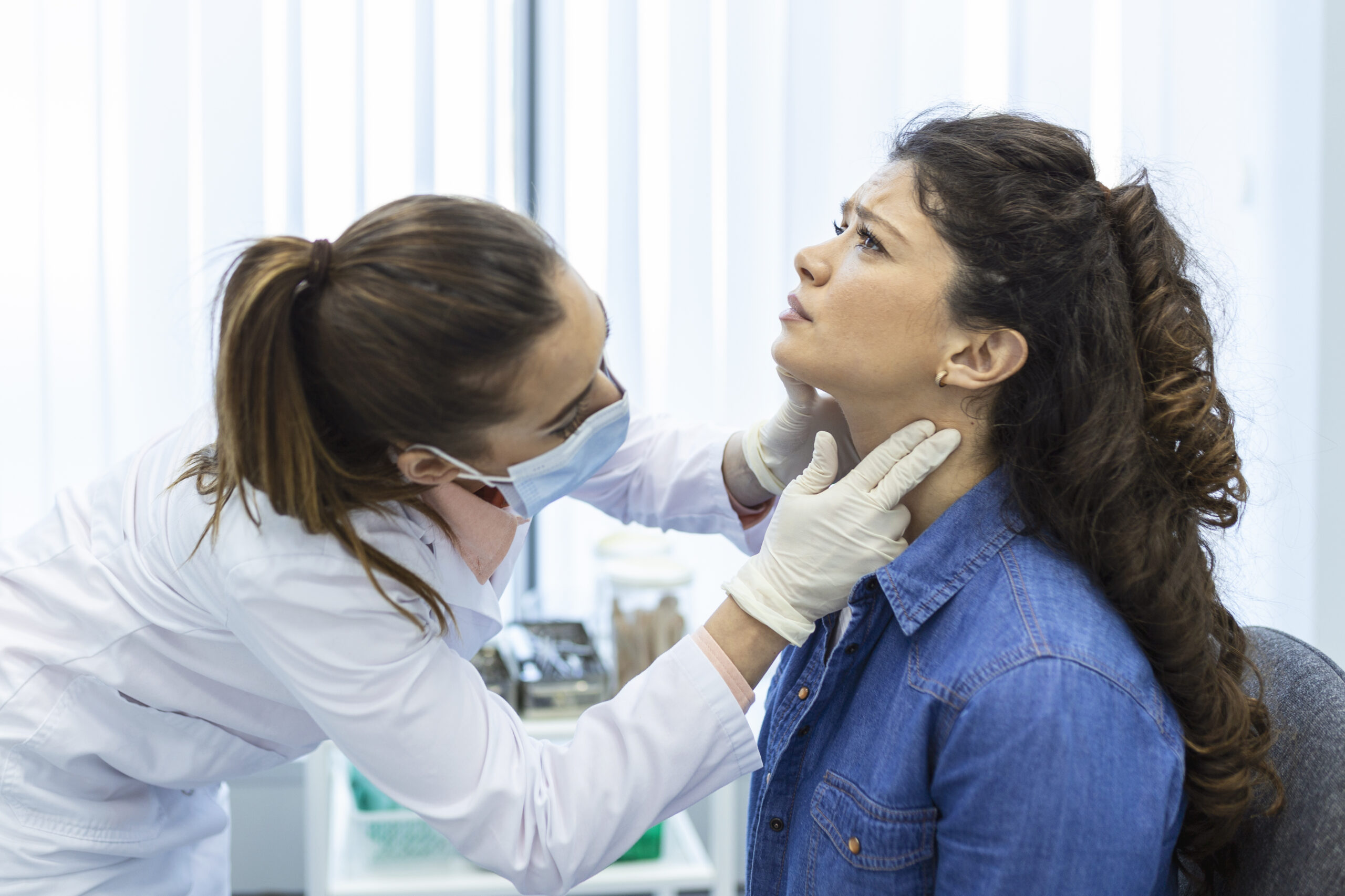
Treatment primarily focuses on taking thyroid medications – unfortunately, usually for the rest of your life. In treating hypothyroidism, torsion is used, and in hyperthyroidism – thermostatic, which “calm down” the hyperactive thyroid. Living with these diseases is neither shorter nor worse – drugs effectively relieve symptoms and improve the body's condition.
In the case of thyroid cancer, removing the whole thyroid or just some part of the gland may be necessary. After such a procedure, the patient faces hypothyroidism, but it does not affect the length of life – if the medications prescribed by the specialist are used. After the procedure, the patient should avoid excessive physical exertion so that the wound on the throat does not spread.
Surgery for certain types of thyroid cancer is followed by treatment with radioactive iodine. It is a safe form of therapy – but not recommended for pregnant and lactating women. The well-being after radioactive iodine is good, and the most common complications are short-term inflammation of the salivary glands, thyroiditis, or nausea and vomiting.
Many people do not even suspect that their thyroid is not functioning accurately. Statistical research shows that women![]() are more often affected than men.
are more often affected than men.
The most common causes of thyroid disease are:
The proper functioning of the thyroid gland also depends on the iodine absorption from the food we eat. Some early signs of thyroid problems are feeling tired, listless, and cold. They are followed by:
The hormonal imbalance may lead to the development of thyroid disease.
Hyperthyroidism![]() consists of increased gland secretory activity, which results in elevated levels of T3 and T4. There are two types of this disease:
consists of increased gland secretory activity, which results in elevated levels of T3 and T4. There are two types of this disease:
They are also overt hyperthyroidism (with characteristic symptoms of hyperthyroidism accompanied by increased hormone levels) and subclinical hyperthyroidism (latent, without symptoms, with the concentration of thyroid hormones within the normal range but increased TSH).
The most common symptoms of hyperthyroidism include:
It is significant to start appropriate treatment immediately after diagnosing hyperthyroidism because this disease can lead to more serious medical problems such as osteoporosis and atrial fibrillation.
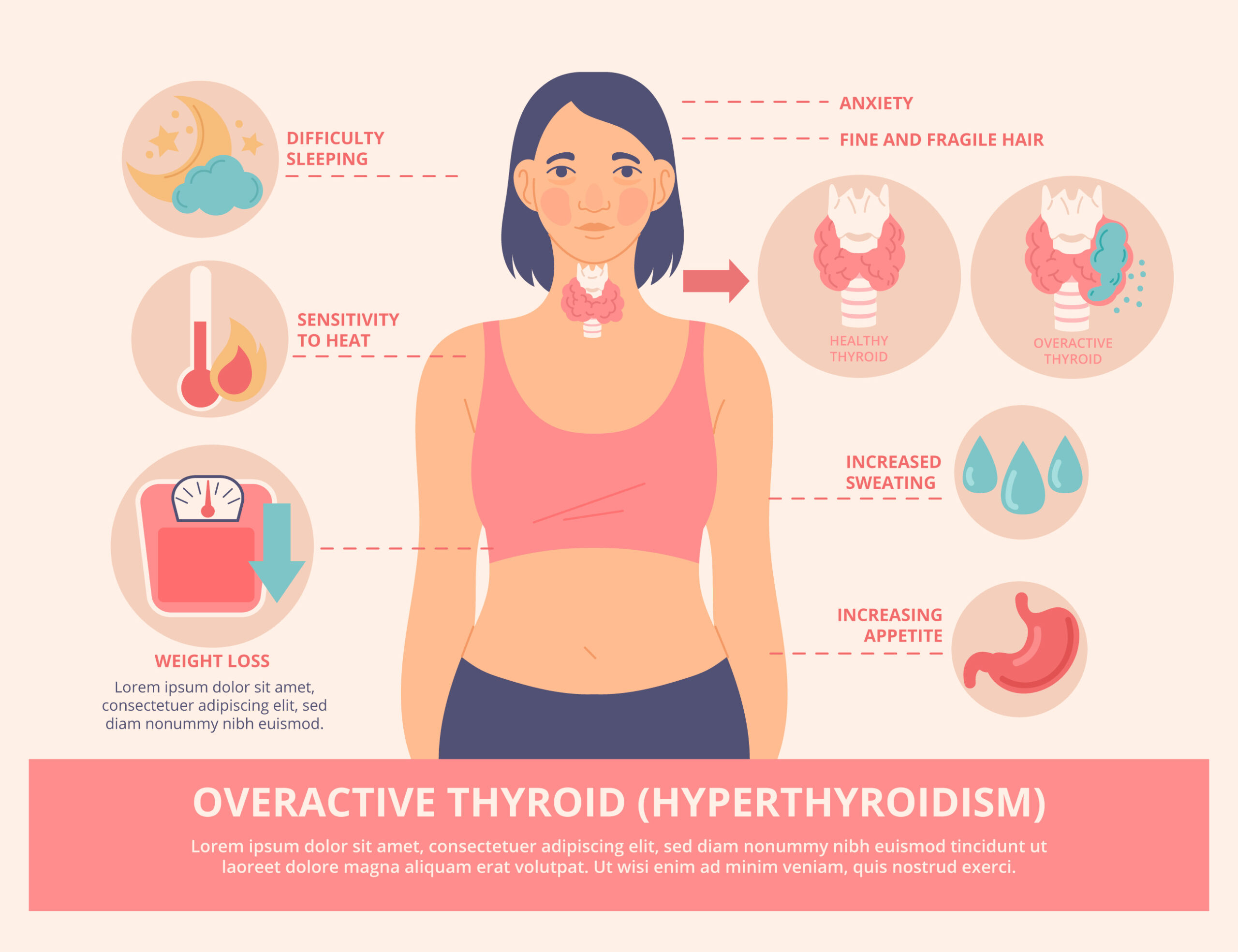
Hypothyroidism![]() is a state of a deficiency of thyroid hormones. The disease is divided into two types:
is a state of a deficiency of thyroid hormones. The disease is divided into two types:
The symptoms of hypothyroidism include:
Hypothyroidism can lead to dangerous complications like cardiovascular diseases, depression, anemia, anxiety disorders, infections, and miscarriages.
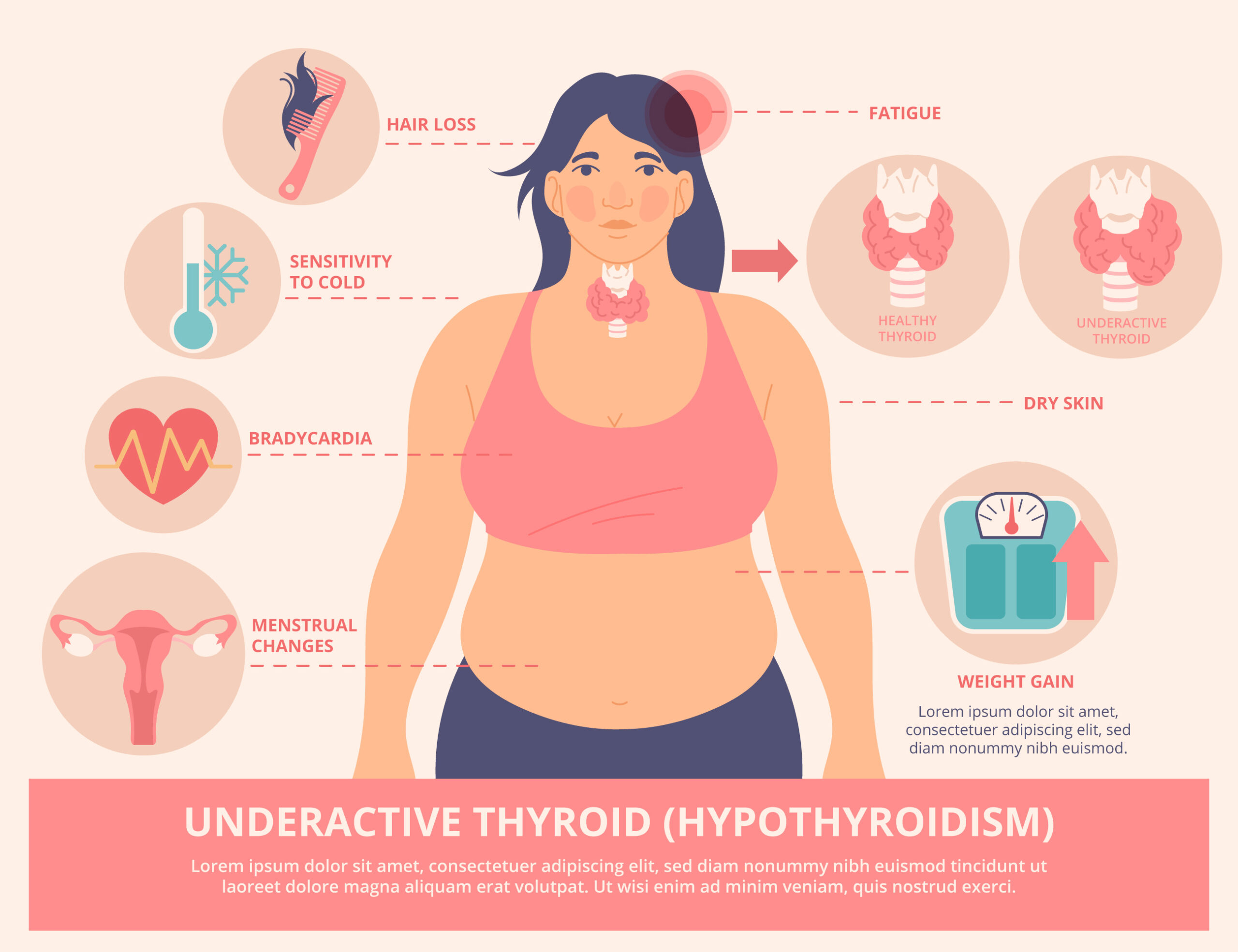
Hashimoto's disease![]() is currently the leading cause of hypothyroidism and mainly affects women. It consists of chronic autoimmune thyroiditis – the immune system produces antibodies against the TPO enzyme (thyroid peroxidase) and Tg protein (thyroglobulin), creating lymphocytes in the thyroid tissue.
is currently the leading cause of hypothyroidism and mainly affects women. It consists of chronic autoimmune thyroiditis – the immune system produces antibodies against the TPO enzyme (thyroid peroxidase) and Tg protein (thyroglobulin), creating lymphocytes in the thyroid tissue.
Signs of Hashimoto's disease include:
The most common thyroid cancer![]() is papillary carcinoma. There are also follicular, anaplastic, and medullary (C-cell) carcinomas. Thyroid cancer can be diagnosed at any age, but its peak incidence is in the 4-5 decades of life. The prognosis is usually good.
is papillary carcinoma. There are also follicular, anaplastic, and medullary (C-cell) carcinomas. Thyroid cancer can be diagnosed at any age, but its peak incidence is in the 4-5 decades of life. The prognosis is usually good.
The only proven factor causing papillary cancer is ionizing radiation – this applies to people after radiotherapy (like in Hodgkin's lymphoma). On the other hand, follicular cancer is more common in iodine-poor areas. Thyroid nodules require initial differentiation by fine-needle biopsy.
Lesions usually enlarge slowly, and initiating treatment as early as possible is significant.
Thyroid blood tests![]() primarily analyze the concentration of hormones produced by the thyroid or pituitary gland.
primarily analyze the concentration of hormones produced by the thyroid or pituitary gland.
The test should be done in the morning because the hormone level fluctuates daily. The TSH result may also interfere with the intake of certain medications.
The normal range for TSH levels is between 0.45 and 4.5 milliunits per liter (mU/L), but the variation depends on age. The older the patient, the higher the TSH may be.
TSH standards![]() are:
are:
FT3, FT4 – The active form of hormones is considered when analyzing thyroid hormones. Analysis of T3 or T4 alone would depend on many additional factors, which could skew the results. The FT3 and FT4 standards are:
If Hashimoto's disease is suspected, the level of anti-thyroid antibodies aTG and aTPO is additionally tested, and in the diagnosis of hyperthyroidism, the level of TRAb. This thyroid-stimulating hormone stimulates the production of TSH.
Patients with thyroid diseases often want to use biotin![]() or vitamin H because of its beneficial effect on hair: it strengthens it and prevents hair loss. Unfortunately, taking biotin above the recommended dose (30 µg) skews the results of thyroid hormones in the blood, suggesting hypothyroidism, even when it is not the case. Another study showed that it also falsifies the results of hyperthyroidism. It is advisable to stop taking biotin 3-4 days before undergoing a thyroid gland blood test.
or vitamin H because of its beneficial effect on hair: it strengthens it and prevents hair loss. Unfortunately, taking biotin above the recommended dose (30 µg) skews the results of thyroid hormones in the blood, suggesting hypothyroidism, even when it is not the case. Another study showed that it also falsifies the results of hyperthyroidism. It is advisable to stop taking biotin 3-4 days before undergoing a thyroid gland blood test.
In addition, the doctor performs an ultrasound (a non-invasive and painless method) of the thyroid gland to check its size, detect nodules, and determine the causes of the hyperfunction of the gland.
A thyroid nodule biopsy is also performed to diagnose thyroid cancer.
Hypothyroidism can contribute to the development of iron deficiency anemia. In other cases, it is hyperthyroidism caused by Graves' disease that can cause anemia. It is recommended to undergo a complete blood count annually to keep track of the red blood cell levels and overall condition of the body.
Patients with hypothyroidism are particularly vulnerable to the accumulation of cholesterol in the body. That can lead to atherosclerosis and, subsequently, to a heart attack. Regular checkups will allow you to modify your diet to avoid serious medical problems.
Homocysteine is an amino acid. Thanks to homocysteine, it is possible to regenerate damaged tissues. Elevated homocysteine levels sometimes accompany hypothyroidism. In addition, too much homocysteine can cause thrombotic problems and atherosclerosis and increase the risk of a heart attack.
The concentration of d-dimer informs about blood clots in the veins. Their elevated level may accompany hyperthyroidism. It can be fully treated if high d-dimer levels caused by hyperthyroidism are noticed early enough.
High calcium levels can accompany hyperparathyroidism and hypothyroidism. With hyperthyroidism, it's good to keep an eye on the indicators responsible for the excellent condition of our skeleton because then the risk of osteoporosis increases. In addition, calcium supports proper blood clotting and neuromuscular signals.
Patients with thyroid disease should scrutinize iron and its stores (like ferritin), as they contribute to the use of (and thus lowering) T3 hormone levels. Iron deficiency can contribute to hypothyroidism and the gland enlargement or worsening of already existing hypothyroidism. In turn, excess iron can lead to thyroid damage.
Table of Contents
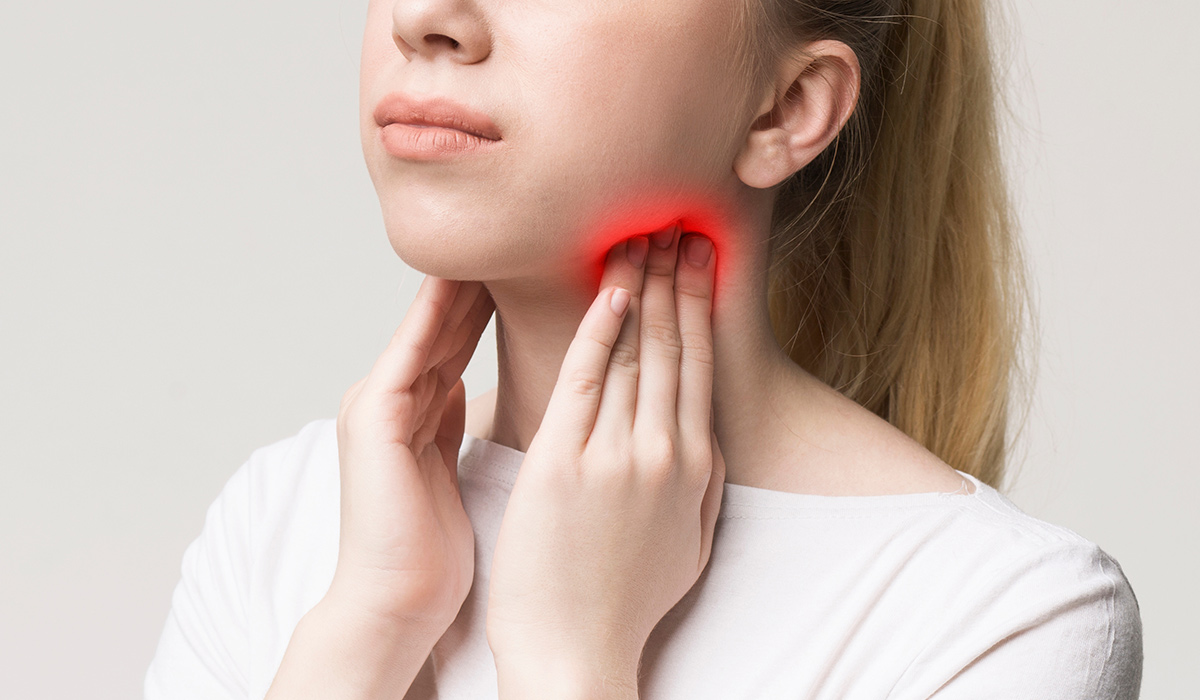
Hyperthyroidism is a condition in which the body produces too many hormones. This causes various symptoms and complications. Check out… read more »

Hypothyroidism is a disease caused by insufficient levels of hormones produced by the thyroid gland. Find out, what are the… read more »
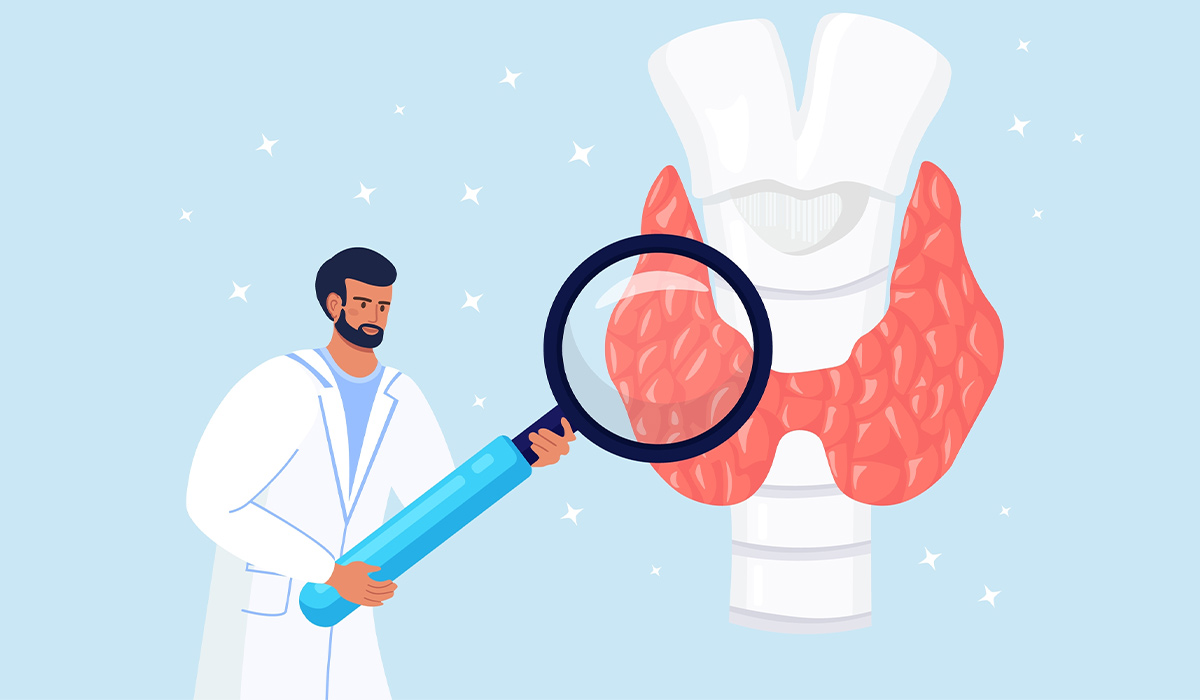
The thyroid is a small organ whose hormones regulate the body's metabolism. Check what are the signs of thyroid problems.… read more »

Also known as Hashimoto's thyroiditis and chronic autoimmune thyroiditis, Hashimoto's disease is an autoimmune condition that causes the immune system… read more »

Hashimoto's disease is an autoimmune disease. May cause hypothyroidism. Check what are the symptoms of Hashimoto's disease and how it… read more »
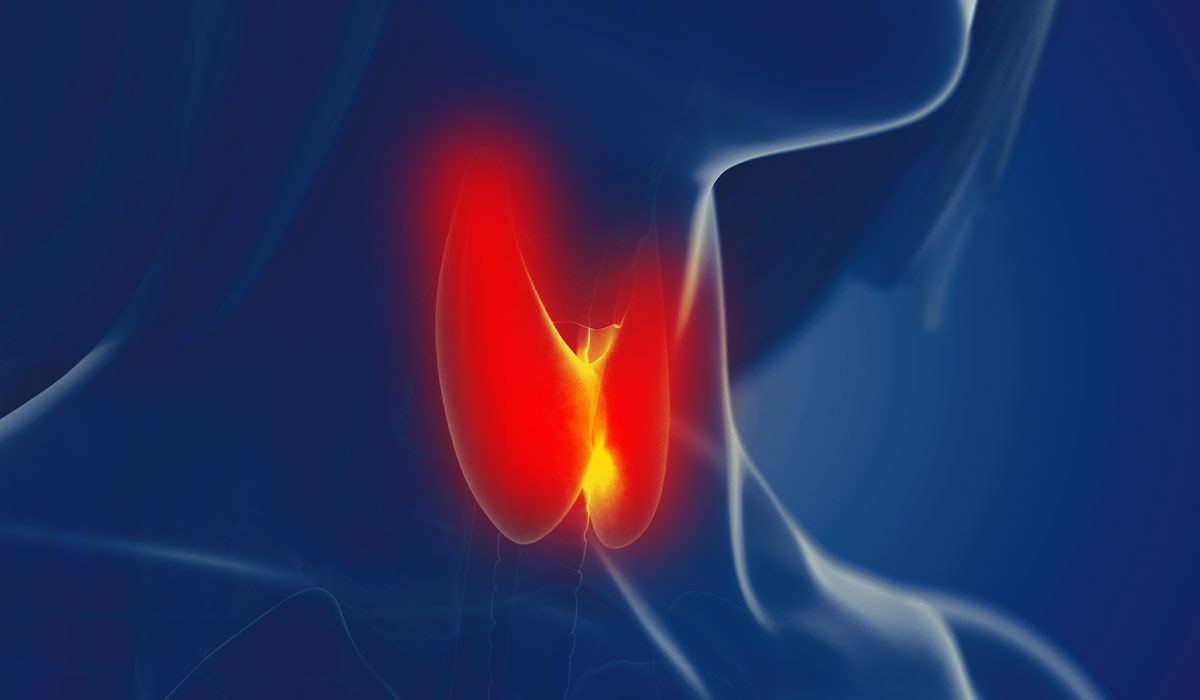
Goiter is an enlargement of this gland. It is not a disease itself, but rather a symptom of a medical… read more »

An endocrinologist is a doctor who deals with the organs that secrete hormones. Learn about diseases that are related to… read more »

Graves' disease is one of many autoimmune diseases that affect various organs, glands, and systems throughout the human body. It… read more »

Biotin (also called vitamin H or vitamin B7) in adequate dosage has a positive impact on health and well-being. Learn,… read more »